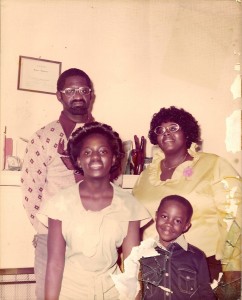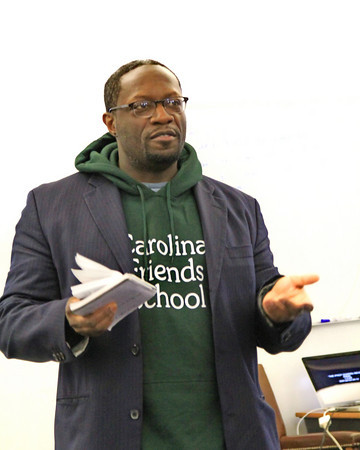 It takes bravery to sit in a classroom
with the wealthiest kids in your city and not truly be one of them; it takes
courage to raise your lonesome ebony hand in a sea of white ones; it takes willingness
to want a better chance through a better education.
It takes bravery to sit in a classroom
with the wealthiest kids in your city and not truly be one of them; it takes
courage to raise your lonesome ebony hand in a sea of white ones; it takes willingness
to want a better chance through a better education.
Those who are brave enough, daring enough and willing enough are normally those who succeed. Yet, those who speak truth are those who bring change and inspire nations.
While filmmaker Andre Robert Lee may not have had the same dreams as a MLK or a Frederick Douglass, his dream is no less noble. As a pioneer in his own right, Lee has a dream to help people find comfort in who they are despite life's circumstances.
In his new film The Prep School Negro, Lee tells the story of how dramatically his life changed after he was given the opportunity to attend one of America's most prestigious prep schools.
Although it seemed like the chance of a
lifetime, Lee soon learned that it would come with many struggles.
In the film, he shares these struggles, allowing viewers to see exactly what he and his family faced throughout his adolescence. Lee also follows the lives of a few teens as they candidly speak about their experiences as black prep school students.
Born and raised between north and west Philadelphia, Pennsylvania in the '70s, Andre Robert Lee grew up in a single parent home with his mother and sister. Considering his low-income lifestyle and being raised without a father, many would assume that Lee would not amount to anything.
However, Lee's mother refused to settle for less. After a student stuck a pencil through Lee's hand in kindergarten, she removed him from the public school system and placed him in a Catholic school until the 9th grade.
During these formative years, filmmaking couldn't have been further from his mind.Because he was black and feared becoming a starving artist, Andre initially lacked confidence in the arts. He had his mind set on teaching.
However, after working with the Ford Foundation from 1996 to 1998 he realized that films could also be educational tools and decided to pursue it as a career, leaving teaching behind.
He didn't know it yet, but Andre was about to begin a journey that would inspire what would be a very successful documentary film.
While attending a basketball summer
reading clinic, Andre was chosen to be a recipient of a full scholarship to
Germantown Friends School, a Quaker-run day school in Philadelphia. He hadn't
known it then, but scouts were watching black students at the camp and picking
the ones they thought would be an asset to their school. After acing a few
tests, Lee enrolled as a high school freshman.
Upon his arrival to this strange, new environment, Andre began his journey to The Prep School Negro.
"I decided from day one that I wanted to tell the story of what it was like to be in prep school because it was so different from everything that I knew," said Lee. It was such a shock to my system that I wanted to tell the story of what it was like."
The shock started for Lee in the classroom.Instead of being one of the brightest, he was just one of the other brilliant students in his class. Instead of blending in as he did at his other predominantly black school, he was now the "Negro" among mostly Caucasian students.
He was in class with a boy whose father owned the factory where his mother and aunt worked all their lives.
"The school tuition was more than what my mother made in a year," Lee said.
The shock then transferred to his family life.
Andre's mother and sister, who had always been involved in his life, also noticed some changes in his behavior.
In the film, his sister says, "That school just took my brother away from me...His walk is different. His talk is different."
Most of all, the question of his family's economics became painfully apparent to him.
As a student, Lee had to face some hard,
cold facts. Not only was he the black one, but he was also the p oor one.
oor one.
While other students were driven to school, he had to walk. While others could afford private lessons in violin and French, his mother worked tirelessly but still couldn't afford them.
Though they seemed unbearable then, each obstacle that Lee faced would become a vignette in his film.
He could have chosen to condemn the system because of the way it made him feel ostracized like a "fish out of water" or that it made him appear out of touch with his home community. Instead, Lee chose to do something else with The Prep School Negro.
"When you go into an environment where
you feel so different, you have to find your inner strength to be strong and
believe in yourself," said Lee.
Today, he shares that message through his film and when he speaks about his experiences.
Not only that, he encourages those from all walks of life that they can succeed despite the cards they were dealt.
"Just because you may not be as lucky as
some other people or have some of the advantages that they have, it doesn't
mean your less," he said.
Andre stresses that in spite of the economic divide in our society, we should look in the face of our "differences" and be proud of who we are. It is what truly matters, he says.
In The Prep School Negro, Lee not only tells his own story but gives modern day African-American prep school students the chance to voice their feelings. He specifically chose students for the film that weren't afraid to bare the raw truth.
As Lee follows each student, viewers are given the opportunity to get a firsthand look at what it is really like to be black in a prep school. They each share their personal struggles and experiences, which makes the film that much more real.
As for the daring and controversial title The Prep School Negro, Lee says that he dubbed it since the ninth grade when he first started at Germantown Friends.
He said that the program through which he got his scholarship to the school called the black students "Negroes" in the 60's. It was why he chose that word.

"I'm not an advocate [of the word Negro]
and I do not think we should bring the word back...but it is a provocative
title that grabs people's attention," said Lee.
Because of Lee's controversial use of the word "Negro," one of his biggest obstacles with the film was finding sponsors that would support such a daring title. And aside from raising funds, Lee's other obstacle was confronting his past through an "introspective journey."
He had to revisit the struggles he faced as a high school student: the shame, the alienation, the double-consciousness. He had to develop confidence in his work and ideas. He also had to deliver them in a way that people from all races, backgrounds and classes could relate.
The Prep School Negro is now inspiring many viewers and changing the way they view the school system.
It caught the attention of Sandra E. Timmons, president of A Better Chance - an organization providing educational opportunities for academically talented black youth like Lee.
Since 1963, A Better Chance has placed more than 12,000 middle and junior high school students in some of America's finest college preparatory schools, both public and private.
These students and their families experience much of the same re-adjustment and "fish out of water" syndromes that Lee underwent.
"The Prep School Negro is an intimate glimpse into one young man's journey of extraordinary cultural change as he moves from his close-knit neighborhood to a prep school. A conversation starter for students, parents, educators and policymakers," said Timmons.
It's obvious that Andre Robert Lee is an artist with a story to tell. He overcame each struggle that he faced with pride and confidence. Now he is a testimony to students that, like him, are different.
Lee is currently working on a short film
called Mama's Hat about
a little boy that goes to church all day every Sunday but wishes he could just
stay home and watch TV. When things don't go as planned for Mama one Sunday,
the little boy learns a life changing lesson.
Lee is also busy working on a longer political feature about the civil rights passages. He specifically focuses on civil rights activist Bayard Rustin in the film.The date is not yet set.

